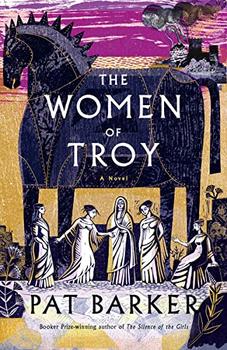Summary | Excerpt | Reading Guide | Reviews | Beyond the book | Read-Alikes | Genres & Themes | Author Bio

Set in the liminal days following the Trojan War, The Women of Troy follows Briseis, who the reader may have met in this novel's precursor, The Silence of the Girls. Briseis begins that story as a free married woman in Troy and ends up a captive and slave of Achilles, the Greek fighter to whom she was given as a war prize when her city was sacked. Though Pat Barker begins The Women of Troy right where the last book left off, the sequel reads comfortably as a standalone. The two novels together, however, form a fuller picture of the life of Briseis.
At the start of The Women of Troy, Achilles is dead and Briseis is pregnant with his child. Achilles had ensured that in the event of his death, Briseis would marry his loyal follower Alcimus. Now the wife of a Greek, Briseis's social status has risen, though she questions whether her newfound security will remain once her child is born, as she is well aware that her marriage was arranged with the wellbeing of Achilles' child in mind. Briseis and all of the Greek warriors and Trojan captives are grounded at the Greek camp, as the winds have been so high that they have been unable to sail home — which causes some to wonder if the gods are preventing them from leaving.
Without the urgency of war to guide her actions, Briseis wanders aimlessly around camp, trying to come to terms with the destruction of her home. The resulting novel is occasionally static, though that criticism is partially a testament to Barker's skill at evoking the languid, helpless atmosphere that characterizes the Greek camp. During her excursions, Briseis meets notable women from the Iliad: Hecuba, once the queen of Troy, now reduced to Odysseus's captive; Cassandra, whose prophecy foretelling the destruction of Troy nobody believed; Andromache, widow of Hector whose infant child was brutally killed in the final days of the war; and Helen, whose beauty launched the thousand Greek ships to Troy in the first place. Amidst the host of Homeric characters is Barker's own creation, Amina, clearly modeled after Antigone, the daughter of Oedipus who sought to bury her brother Polynices in the Sophocles play named for her. Against all odds (and against Briseis's advice), Amina is determined to bury Priam, the king of Troy, who was brutally slaughtered at the hands of Pyrrhus.
The Women of Troy notably opens with a chapter from the perspective of Pyrrhus, the son of Achilles who arrived at Troy too late to see his father while he was alive, but in time to be part of the group of elite soldiers smuggled into Troy inside the wooden horse (who then opened the gates from the inside, enabling the Greeks to take the city). Pyrrhus's perspective (along with that of Calchas, a Trojan seer who has lived with the Greeks since the beginning of the war) is interspersed throughout the novel — interestingly, in the third-person present tense, compared to Briseis's chapters which are told in first-person past tense. This creates a heightened contrast between Briseis's rational, reflective narration and the frantic, careless actions taken by the men in the story.
But when it focuses on the female characters, The Women of Troy is a quiet, subtle novel. In many ways, this project exemplifies what Barker proved in The Silence of the Girls: that she isn't interested in the battlefield, but rather, the unassuming moments that follow bloodshed. Unfortunately, Briseis's narration never fully justifies itself. With a host of fascinating female characters littering the background, the choice to narrate the novel from the perspective of a character whose story arc could have concluded at the end of the previous volume feels like a missed opportunity (which Barker clearly intends to rectify with the third part of the trilogy, publishing in 2023, which will be told from Cassandra's point of view). But still, Barker's characters are so brilliantly drawn (Pyrrhus in particular is a marvelous addition), and her writing is so sharp that The Women of Troy is a pleasure to spend time with, even when it occasionally falters as a sequel.
![]() This review was originally published in The BookBrowse Review in October 2021, and has been updated for the
September 2022 edition.
Click here to go to this issue.
This review was originally published in The BookBrowse Review in October 2021, and has been updated for the
September 2022 edition.
Click here to go to this issue.

If you liked The Women of Troy, try these:

by Ferdia Lennon
Published 2025
An utterly original celebration of that which binds humanity across battle lines and history.

by Caro De Robertis
Published 2024
Perfect for fans of Circe and Black Sun, this bold and subversive feminist retelling of the Greek myth of Psyche and Eros explores the power of queer joy and freedom.
People who bite the hand that feeds them usually lick the boot that kicks them
Click Here to find out who said this, as well as discovering other famous literary quotes!
Your guide toexceptional books
BookBrowse seeks out and recommends the best in contemporary fiction and nonfiction—books that not only engage and entertain but also deepen our understanding of ourselves and the world around us.